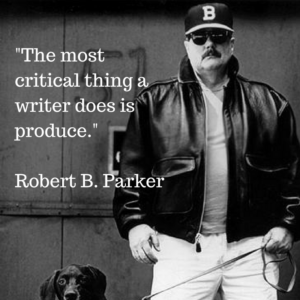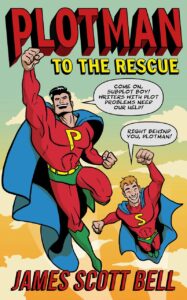by James Scott Bell
@jamesscottbell
 Sometimes it’s just plain hard to write. Like when you’re sick. Or feeling drained from a job. I recently went through a season of this, a mix of some medical stuff and general lethargy. For the first time in 25 years, I found myself missing my weekly quota disturbingly often.
Sometimes it’s just plain hard to write. Like when you’re sick. Or feeling drained from a job. I recently went through a season of this, a mix of some medical stuff and general lethargy. For the first time in 25 years, I found myself missing my weekly quota disturbingly often.
It made me mad. I’ve always tried to stay in the tradition of the great pulp writers, who had to produce or they wouldn’t eat.
Erle Stanley Garner routinely wrote a million words a year.
John D. MacDonald was known as the writer with the red-hot typewriter.
My keyboard was getting cold. So I had to go back and re-establish some disciplines. Here they are:
- Plan the next day’s writing the night before
At night, when I’m always too spent to produce more, I take just a few minutes to think about what I’ll write tomorrow. Hemingway famously said he’d leave off writing midsentence, so he could take off running the next day.
So I think about the scene I’m going to write next. I give it some structure brainstorming: Objective, Obstacles, Outcome.
Then I’ll write one sentence. Just one. And that’s where I start when morning comes. Which brings me to tip #2:
- Sleep
We all know that good, restorative sleep makes a big difference in our daily lives. We also know sleep problems are rife, especially in the anxiety-inducing world we live in.
That’s why there’s a boom in sleep products. The most common ingredient is melatonin. I like to manage my melatonin naturally. I try to get ten to fifteen minutes of sunlight between 11 a.m. and 1 p.m. (good for Vitamin D, too). I also try to keep off the blue light of phone and computer and TV screens before bed. If I do some computer or watch some TV, I wear yellow-tint glasses. This renders color movies or shows a bit, well, yellowish. But I can live—and sleep—with that.
Now here’s JSB’s secret tip for a good night’s sleep: Quercetin. I pop an 800mg tab half an hour before I hit the pillow. I no longer wake up in the middle of the night.
And here is an added benefit: Quercetin is an ionophore. That means it’s a molecule that helps your cells absorb good things, like zinc. Another ionophore is hydroxychloroquine. Remember the suppression of HCQ at the beginning of Covid? Don’t get me started on the political and medical malpractice of that. HCQ, like quercetien, helps the cells absorb zinc which, along with D, is the Praetorian Guard of the immune system.
Thus the adage “An apple a day keeps the doctor away.” Apples are a great source of quercetin. That’s why all those apple-egg-meat eating farmers never got sick.
- Write first thing in the morning
Well, second thing. First thing is make the coffee. Mrs. B and I spend devotional time together, so I get up earlier and knock out a Nifty 250 (or 350 if I’m going good) before she joins me in the living room. I sometimes do this on my laptop. I used to do it on my beloved AlphaSmart. But Alphie is showing his age lately, so I invested in a very cool Macally wireless keyboard that has a slot for your phone or tablet. I write my words in Google Docs.
Getting a 250 or 350 jump on the day makes hitting the quota so much easier.
I’ll sometimes do some morning pages to get the engine started. This often results in a new idea for a story. [Note: I don’t count morning pages in my quota, unless I end up using some of them in a project.]
- Sprint
I look at 250 word chunks as “writing sprints.” Go fast. Catch my breath. Then sprint some more.
Periodically, I stand and move around, so I’m not on my butt for more than a half hour at a time.
- Lightly edit the previous day’s writing
I emphasize the word lightly. I’m not going to labor over things, but just go over the pages to make obvious changes. More often than not, I add new words (which counts toward my quota).
- More than one project
I usually have at least two projects going. My novel is primary, and if I’m going good I push through to the quota. But, like Asimov, if I get to a cul-de-sac I jump over to another project—usually a short story or a piece of nonfiction—and work on that for awhile.
Following this plan, I find myself more easily hitting my daily quota of 1k. I finished typing this at 11:07 a.m. Friday, and my word count is 1754. Now I can look forward to lunch. Hawaiian pizza, anyone? Ha!
What about you? What do you do to stay productive, even if you’re not feeling like it?


